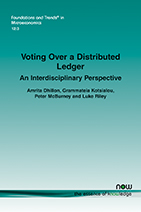Voting Over a Distributed Ledger: An Interdisciplinary Perspective
By Amrita Dhillon, King’s College London, UK, amrita.dhillon@kcl.ac.uk | Grammateia Kotsialou, London School of Economics and Political Science, UK, g.m.kotsialou@lse.ac.uk | Peter McBurney, King’s College London, UK, peter.mcburney@kcl.ac.uk | Luke Riley, Quant Network and King’s College London, UK, luke.riley@kcl.ac.uk
Abstract
This work discusses the potential of a blockchain based infrastructure for a decentralised online voting platform. When compared to monograph based voting, online voting can vastly increase the speed that votes can be counted, expand the overall accessibility of the election system and decrease the cost of turnout. Yet despite these advantages, online voting for political office is subject to fraud at various levels due to its centralised nature. In this monograph, we describe a general architecture of a centralised online voting system and detail which areas of such a system are vulnerable to electoral fraud. We then proceed to introduce the key ideas underlying blockchain technology as a decentralised mechanism that can address these problems. We discuss the advantages and weaknesses of the blockchain technology, the protocols the technology uses and what criteria a good blockchain protocol should satisfy (depending on the voting application). We argue that the decentralisation inherent in the blockchain technology could increase the public’s trust in national elections, as well as eliminate voter impersonation and double voting. We conclude with a discussion regarding how economists and social scientists can collaborate with the blockchain community in a research agenda on the design of efficient blockchain protocols and new voting systems such as liquid democracy.
Voting Over a Distributed Ledger: An Interdisciplinary Perspective
Voting Over a Distributed Ledger: An Interdisciplinary Perspective presents the case that electronic voting can improve accessibility, leading to some positive outcomes. It can also lead to faster counting and can be cost efficient. The authors document the various problems with centralized electronic voting systems and show how the blockchain can potentially overcome these problems. The authors introduce the concept of distributed ledger technology (DLT) (blockchains are a special case of DLT) and how they can improve both the accessibility and trust properties of an online voting system.
This monograph is organized as follows. Section 2 focuses on centralized on-line voting systems (i.e., that do not use distributed ledger technology), describing their general architecture and outlining their vulnerable areas for manipulation. Section 3 describes from scratch the distributed ledger technology and how its promising features can be used for online voting. Section 4 focuses on a special case of distributed ledgers, called blockchains, and analyses the multiple ways (consensus protocols) on reaching agreement on voting data. Section 5 discusses a possible conceptualization on using a blockchain based infrastructure for voting systems. Section 6 presents existing blockchain based voting systems by categorizing them according to the extent that they use this technology, concluding with details of a recent academic implementation. Finally, Section 7 concludes with open questions for economists and other social scientists working in this area.
